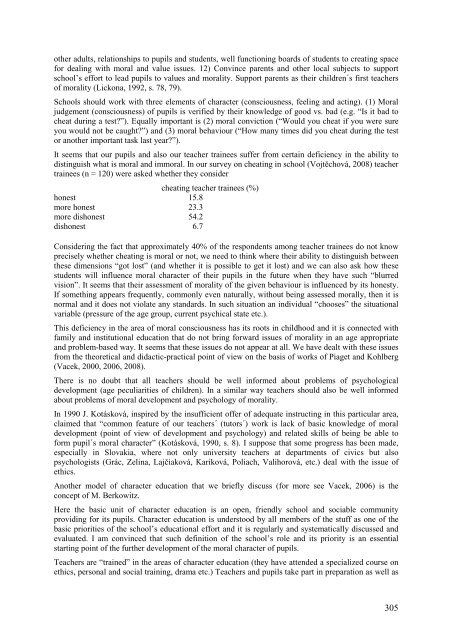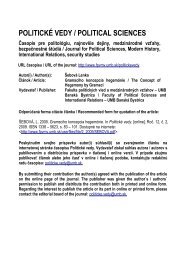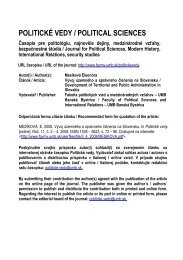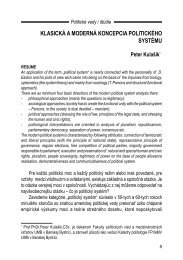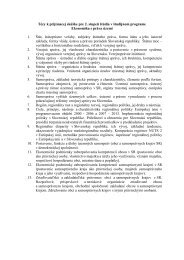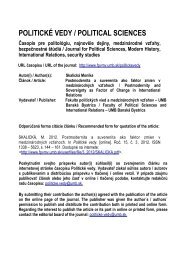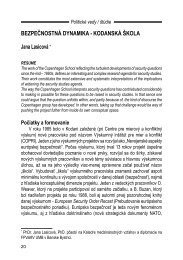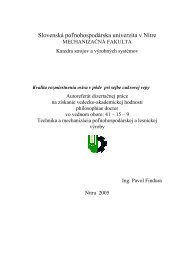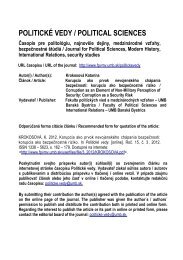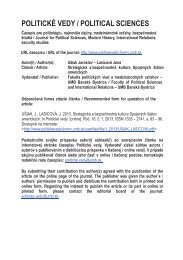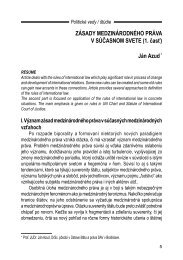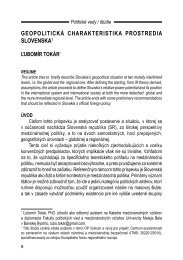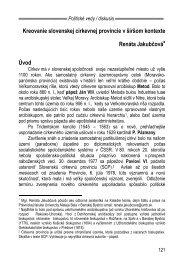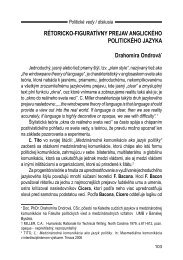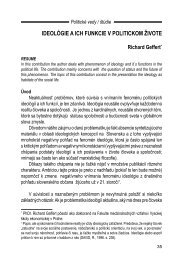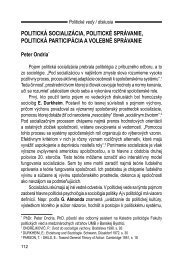MRAVNÃ VÃCHOVA V Å KOLÃCH NA SLOVENSKU A V ZAHRANI ÄÃ
MRAVNÃ VÃCHOVA V Å KOLÃCH NA SLOVENSKU A V ZAHRANI ÄÃ
MRAVNÃ VÃCHOVA V Å KOLÃCH NA SLOVENSKU A V ZAHRANI ÄÃ
You also want an ePaper? Increase the reach of your titles
YUMPU automatically turns print PDFs into web optimized ePapers that Google loves.
other adults, relationships to pupils and students, well functioning boards of students to creating space<br />
for dealing with moral and value issues. 12) Convince parents and other local subjects to support<br />
school’s effort to lead pupils to values and morality. Support parents as their children´s first teachers<br />
of morality (Lickona, 1992, s. 78, 79).<br />
Schools should work with three elements of character (consciousness, feeling and acting). (1) Moral<br />
judgement (consciousness) of pupils is verified by their knowledge of good vs. bad (e.g. “Is it bad to<br />
cheat during a test”). Equally important is (2) moral conviction (“Would you cheat if you were sure<br />
you would not be caught”) and (3) moral behaviour (“How many times did you cheat during the test<br />
or another important task last year”).<br />
It seems that our pupils and also our teacher trainees suffer from certain deficiency in the ability to<br />
distinguish what is moral and immoral. In our survey on cheating in school (Vojtěchová, 2008) teacher<br />
trainees (n = 120) were asked whether they consider<br />
cheating teacher trainees (%)<br />
honest 15.8<br />
more honest 23.3<br />
more dishonest 54.2<br />
dishonest 6.7<br />
Considering the fact that approximately 40% of the respondents among teacher trainees do not know<br />
precisely whether cheating is moral or not, we need to think where their ability to distinguish between<br />
these dimensions “got lost” (and whether it is possible to get it lost) and we can also ask how these<br />
students will influence moral character of their pupils in the future when they have such “blurred<br />
vision”. It seems that their assessment of morality of the given behaviour is influenced by its honesty.<br />
If something appears frequently, commonly even naturally, without being assessed morally, then it is<br />
normal and it does not violate any standards. In such situation an individual “chooses” the situational<br />
variable (pressure of the age group, current psychical state etc.).<br />
This deficiency in the area of moral consciousness has its roots in childhood and it is connected with<br />
family and institutional education that do not bring forward issues of morality in an age appropriate<br />
and problem-based way. It seems that these issues do not appear at all. We have dealt with these issues<br />
from the theoretical and didactic-practical point of view on the basis of works of Piaget and Kohlberg<br />
(Vacek, 2000, 2006, 2008).<br />
There is no doubt that all teachers should be well informed about problems of psychological<br />
development (age peculiarities of children). In a similar way teachers should also be well informed<br />
about problems of moral development and psychology of morality.<br />
In 1990 J. Kotásková, inspired by the insufficient offer of adequate instructing in this particular area,<br />
claimed that “common feature of our teachers´ (tutors´) work is lack of basic knowledge of moral<br />
development (point of view of development and psychology) and related skills of being be able to<br />
form pupil´s moral character” (Kotásková, 1990, s. 8). I suppose that some progress has been made,<br />
especially in Slovakia, where not only university teachers at departments of civics but also<br />
psychologists (Grác, Zelina, Lajčiaková, Kariková, Poliach, Valihorová, etc.) deal with the issue of<br />
ethics.<br />
Another model of character education that we briefly discuss (for more see Vacek, 2006) is the<br />
concept of M. Berkowitz.<br />
Here the basic unit of character education is an open, friendly school and sociable community<br />
providing for its pupils. Character education is understood by all members of the stuff as one of the<br />
basic priorities of the school’s educational effort and it is regularly and systematically discussed and<br />
evaluated. I am convinced that such definition of the school’s role and its priority is an essential<br />
starting point of the further development of the moral character of pupils.<br />
Teachers are “trained” in the areas of character education (they have attended a specialized course on<br />
ethics, personal and social training, drama etc.) Teachers and pupils take part in preparation as well as<br />
305


